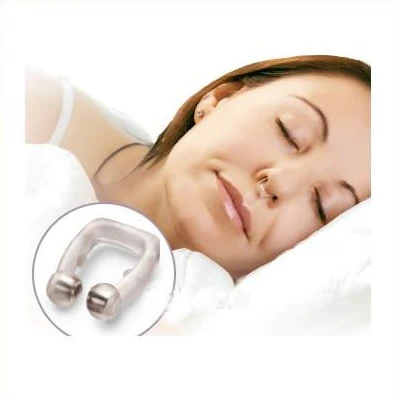Snoring can disturb sleep, affecting both the snorer and their partner. To address this issue, many people look for anti-snoring aids. Nose clips are one option worth considering.
This article examines whether nose clips work for snoring and explains how they function.
Table of Contents
What are Nose Clips for Snoring?

Nose clips for snoring are not like swimming nose clips. Unlike the ones swimmers use, snoring nose clips don’t pinch the nostrils shut.
Instead, they sit inside the nostrils, allowing for proper nose breathing. They typically look like a U-shaped piece of plastic with magnets on the tips, often called “magnetic nose clips.”
Do Nose Clips Work for Snoring?
Yes, nose clips can help reduce snoring by improving airflow through widened nasal passageways. They have a unique shape and use magnets to stay in place. However, they may not be suitable for people with TMJ, nasal polyps, tumors, or severe sinusitis.
Nose clips work well for snorers with congestion or narrow nasal passages. Still, some users find that they don’t completely eliminate snoring.
Nose Clips vs. Internal Dilators for Snoring
It’s important to understand the difference between internal nasal dilators and snoring nose clips. These solutions have distinct designs and comfort levels.
Internal nasal dilators, like Mute Snoring by Rhinomed, are lightweight and comfy. They consist of two open cones in the nostrils, gently keeping them open for better nasal breathing and reducing mouth breathing. Some, like Venyn Snore Guard, use paddle-like devices made of plastic or silicone for the same effect.
On the other hand, snoring nose clips, often made of plastic or silicone, have a thicker clip section than dilators.
Many users find magnetic nose clips uncomfortable because they pinch and grip the septum in the middle of the nose, unlike dilators that gently push nostrils open.
Pros and Cons of Nose Clips
Pros:
-
Effective for Clogged or Narrow Nasal Passageways: Nose clips can be beneficial for individuals who snore due to obstructed or narrow nasal passages, providing relief and potentially reducing snoring.
-
Reusable: Nose clips are a sustainable option as they can be reused, contributing to environmental friendliness.
Cons:
-
Ineffectiveness for Mouth or Throat-Based Snoring: Nose clips may not be effective for individuals whose snoring is primarily caused by issues related to the mouth or throat.
-
Not Suitable for Severe Nasal Issues or TMJ: Individuals with severe nasal problems or temporomandibular joint (TMJ) issues may find nose clips unsuitable for addressing their snoring concerns.
-
Potential Discomfort: Some users may find nose clips uncomfortable to wear, which can be a drawback for those seeking a more comfortable solution.
Nose Clips Alternatives
If you snore and want to stop, there are other options besides nose clips.
Mouthpieces like MADs and TSDs tackle snoring by addressing throat obstruction. MADs pull the tongue forward, improving airflow, and TSDs stabilize the tongue.
Internal nasal dilators help nose breathing.
Nasal strips and chinstraps are additional alternatives that enhance nasal airflow and prevent mouth breathing, respectively.
You may also want to check out some anti-snoring devices or anti-snoring mouthpieces.
Learn more: How to Stop Snoring: 15 Best Remedies
Stop Snoring with Effective Treatment
If you’ve tried snoring products mentioned above, keep in mind their effectiveness can change over time. Consult a doctor to understand your snoring’s root cause, especially if it could be linked to serious conditions like sleep apnea.
Luckily, there are alternatives beyond over-the-counter remedies. Dr. Kayem offers minimally invasive treatments for various types of snoring and sleep apnea, including low-power radio frequency (RF) treatments. These target excess tissue, providing long-lasting results and an alternative to CPAP machines.
A quick 15-minute office procedure, utilizing a concealed stitch in the soft palate, has shown excellent efficacy and safety.